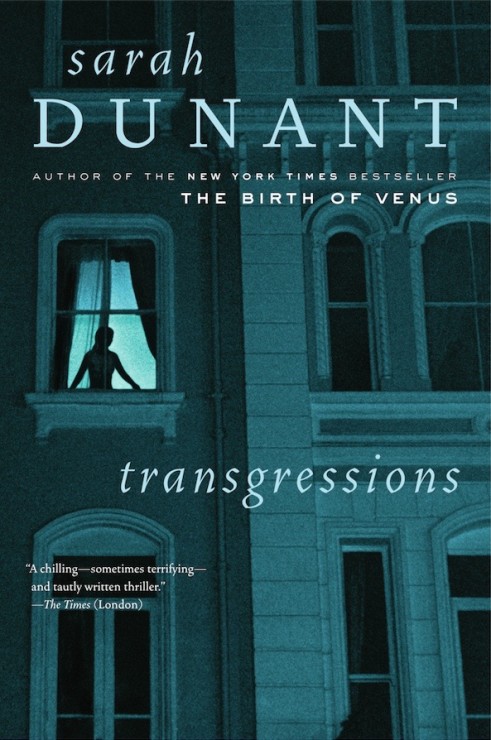A review of literary history might lead one to conclude that menstruation was a generally uncommon phenomenon, especially if one’s reading history was drawn from the work of male authors. Despite all their graphic sexual depictions, the women of Henry Miller, D. H. Lawrence, Ernest Hemingway, and a host of others never had to deal with having a menstrual cycle. Understandably, this is not the case with many women novelists and a few males, and over the years this blog has taken up the challenge of exploring how menstrual life has appeared in fiction, for example in previous posts about the work of Ann Patchett, Haruki Murakami, and Margaret Atwood, to name a few. And, we have also cited the work of Dana Medoro whose path-breaking work, Bleeding in America, delved into the menstrual themes of the few American authors who treated the topic with particular insight.
Now Kelly Renn has drawn to our attention another noteworthy perspective in Sarah Dunant’s 1997 novel, Transgressions.
Analysis by Kelly Renn:
 In the novel, Elizabeth, a very independent and successful woman, is alone after the break-up of her seven-year relationship. She is dealing with all the emotions that one goes through but she also begins to think that she’s losing her mind because weird things keep happening around her large, empty house. At first she thinks it’s her ex, then she thinks it’s a ghost, or her own madness. We find out that it is a stalker which sounds predictable, as though the plot is heading in a conventional direction, but it isn’t. The stalker hides in her house one night with the intention to rape her. Elizabeth wakes up to find him on her bed, waiting. Instead of being raped, she somewhat seduces him and allows him to have sex with her, and even though the entire time she is petrified and violated by the act, she feels that it is the only way to save her own life. Later that night after she has gone to bed and washed the sheets she wakes up to find blood. Her own. Here’s the way Dunant describes Elizabeth’s response:
In the novel, Elizabeth, a very independent and successful woman, is alone after the break-up of her seven-year relationship. She is dealing with all the emotions that one goes through but she also begins to think that she’s losing her mind because weird things keep happening around her large, empty house. At first she thinks it’s her ex, then she thinks it’s a ghost, or her own madness. We find out that it is a stalker which sounds predictable, as though the plot is heading in a conventional direction, but it isn’t. The stalker hides in her house one night with the intention to rape her. Elizabeth wakes up to find him on her bed, waiting. Instead of being raped, she somewhat seduces him and allows him to have sex with her, and even though the entire time she is petrified and violated by the act, she feels that it is the only way to save her own life. Later that night after she has gone to bed and washed the sheets she wakes up to find blood. Her own. Here’s the way Dunant describes Elizabeth’s response:
Her fingers came out red and sticky. She pulled back the covers. There was blood everywhere, caught in her pubic hair, smeared over her thighs, and a fat stain of it soaking into the sheets. The panic turned to jubilation. She was bleeding early, her body joining in the victory, sluicing out all final remains of him, even down to the lining of her womb. There would be no need for doctors or morning-after pills now. She was doing her own healing….
It made her think about how rarely periods featured in books. Could it be that ficitional women menstruate less often than real ones? Clarissa, Anna Karenina, Scarlett O’Hara–not a soiled sanitary pad among them. The few books in which she could remember the heroines bleeding were ones set in convent schools–studies in hothouse guilt where the only acceptable blood was the miraculous kind, transubstantiating from alcohol to plasma in the communion cups.
And a few paragraphs later..
It wouldn’t have been the same for him, she thought. What would he have done if he had pulled his prick out of her only to find it bleeding? Would the fear of one kind of blood have led him to another? Hammers and nails. Rape and crucifixion-maybe Catholic girls have learned more about life than they realize.
She slid her finger up inside herself, feeling the wad of compressed cotton and the moistness already gathering at its edge. She ran her finger down the glass, leaving a smear on the pane. “See that” she said, softly into the glass. “My blood’s stronger than your sperm.”
It turns out that not only does the character have a surprisingly distanced and scholarly perspective on her own rape, but she is able to speculate on all manner of gender politics in the aftermath. The scene raises some important questions. Why did she not report the assault to the police? Will she? Would the onset of one’s period in such a circumstance have any effect on the ability to gather DNA evidence? Unfortunately, none of these questions are addressed in the novel, but it points out the fact that women writers are likely to bring perspectives to such topics that are far removed from any that male authors would entertain.
Kelly M. Renn is a maternity rights activist and Labor Doula. She is also an Early Childhood Educator and outspoken supporter of women’s reproductive rights. Her website is KellyBellyBirth.com.

